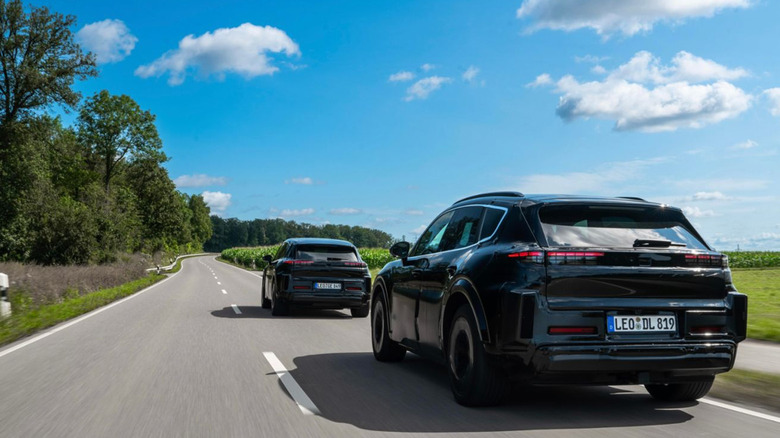Porsche Details New Cayenne's Three Engine Strategy, And EV Skeptics Will Be Relieved
The path to a fully electric future has been a rocky one, and the adoption of electric vehicles hasn't exactly lit the world on fire. As a result, it's easy to be an EV skeptic, but Porsche attempts to put those worries to rest with the news of a fully electric Cayenne on the horizon while still leaving options for people not ready to buy in. In an announcement on July 25, Porsche revealed the Cayenne will have three powertrains to choose from up to and beyond 2030. These include a regular gas option, a hybrid, and the fully electric version. Moving forward from there, the fourth-generation Cayenne SUVs will be all-electric, but that doesn't mean you have to ditch the gas right away.
When the fourth-generation releases, Porsche confirmed it will continue to offer the third-gen Cayennes alongside it. On top of that, Porsche will continue making upgrades to the line, so you don't have to jump ship immediately to an EV if you don't want to. The company says this strategy could ultimately lead to 80% of its cars being fully electric by 2030, but it'll come down to customer demand.
If you plan on sticking with the V8 engine, Porsche is wary of possible emission guidelines down the road and is taking proactive action. The company says it's working to ensure the engine is ready to comply with any future requirements.
Porsche is making big strides in EVs
The Cayenne being all-electric with its next generation isn't the only thing to look forward to from Porsche. For the 2025 model year, Porsche is upping its electric Macan trims to four, a rise from the typical two offered by the company. Adding more options for buyers seems to be a good indicator that business is good enough for Porsche to continue ramping up the production of EVs. Like the Cayenne, the Macan still offers non-electric models for anybody not ready to buy in.
Although Porsche is increasing production, we see companies like Ford struggling to turn a profit on EVs. There are still many issues making EVs a tough sell for the average driver. A big factor is the cost of these vehicles being much higher than their gas counterparts. Although you save at the pump by not having to go, the upfront cost is higher. Infrastructure like charging stations continues to be a problem, but strides are being made there. Some experts predict an EV U-turn could take place once the cost and charging problems are solved.

